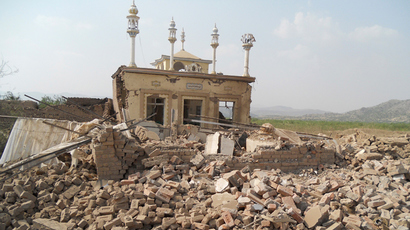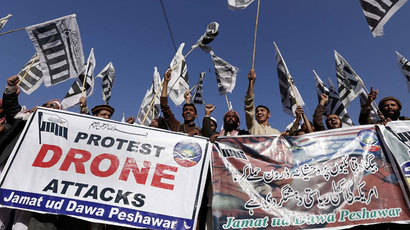‘Not bug splats’: Artists use poster-child in Pakistan drone protest

A poster of a young child has appeared in north-west Pakistan to raise awareness of the numerous drone attacks the region suffered. Artists who created the image hope military commanders will think twice about shooting after seeing the portrait.
More than 200 children are believed to have died in the heavily-bombed Khyber Pukhtoonkhwa according to the website notabugsplat.com. ‘Bug splat’ is the name given by the military to a person who has been killed by a drone. Viewing the body through a grainy computer image gives the impression that an insect has been crushed.
Now a giant portrait of a young child has been produced to try and raise awareness of civilian casualties in the region. The hope is now the drone operator will see a child’s face on his or her computer screen, rather than just a small white dot and may think twice before attacking indiscriminately.
The child featured in the poster is nameless, but according to the Foundation for Fundamental Rights, who helped to launch the project in collaboration with a number of artists, both parents were lost to a drone attack.
Drone raids in Pakistan started in 2004 under George W. Bush’s administration as part of the US War on Terror. The vast majority of strikes have focused on the Federally Administered Tribal Area’s and the Khyber Pukhtoonkhwa area due to their proximity to Afghanistan, which the country invaded following the September 11 terrorist attacks.

The United States says drones, which have been continued under Barak Obama’s presidency are more accurate than any other weapon and a vital tool for killing Al-Qaeda and Taliban leaders. But Pakistani deaths from drone strikes are estimated at between 2,537 and 3,646 over the period from 2004 to 2013, the Bureau of Investigative Journalism says, drawing on media reports.
Civilian deaths have long strained relations between the United States and Pakistan. The issue of drone strikes, while remaining largely out of US headlines, has become one of the most polarizing in Pakistan. While previous reports have made it clear that Pakistani leaders have authorized at least some drone strikes, they publicly maintain that that American unmanned aerial vehicles constantly buzzing in the skies undermine Pakistan’s sovereignty.
Islamabad has tried to convince the United Nations Human Rights Council to pass a resolution that would force US drone strikes to adhere to international law. However, America has not been forthcoming and boycotted recent talks in Geneva.
The number of drone strikes in Pakistan has at least fallen over the last month as the Pakistani government asked the US to limit the number of attacks as they entered peace talks with the Pakistani Taliban.















